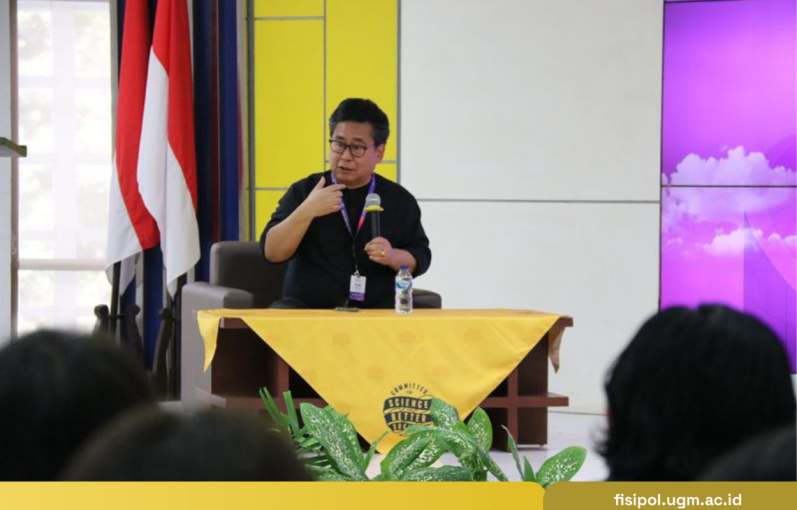
Yogyakarta, October 1st 2025 – Seventy years after the historic event of Bandung Conference in 1955, where twenty nine leaders from Asia and Africa united against colonialism and formulated a new vision for the world, the spirit of Bandung remains relevant today. The Institute of International Studies (IIS), Faculty of Social and Political Sciences (FISIPOL) at Universitas Gadjah Mada (UGM), carries this spirit forward by organizing the Annual Convention on the Global South (GO SOUTH 2025) on October 1–2, 2025. This convention will be held offline at the campus of UGM, Yogyakarta, and carries the theme: “70 Years of the Bandung Spirit: Re-invigorating the Decolonial Struggle amidst Geopolitical Turbulence.” This convention will be a forum dedicated to examining the dynamics of the Global South, which continues to evolve amid the complexity of the current global geopolitical and economic situation.
The Bandung Conference was an important moment in history that ignited a wave of anti-colonial struggle and solidarity among newly independent countries. However, this global emancipation project faced serious challenges—from imperialist pressure and internal friction to debt crises that shackled economic independence and sustainable development.
Prof. Vedi Hadiz, Professor at the University of Melbourne, stated in his keynote speech that the Bandung Conference was highlighted as a form of solidarity against colonialism and imperialism, which is closely related to the theory of decolonization. Prof. Vedi also conveyed other points related to emancipatory narratives, as well as how to utilize the concept of decolonization theory to project ideas of a just and peaceful world order amid geopolitical turmoil.
“The theory of decolonization is a form of ambition to free ourselves from epistemological dependence on Western powers. If we look back, what is underlined is cooperation among Global South countries themselves. Helping each other to support one another,” he said.
In his speech, the Dean of the School of International Studies at Xiamen University, Prof. Yanjie Gao, also emphasized collaboration between Global South countries to decolonize knowledge.
“We are meeting at a moment of profound global transformation, geopolitically, economically, and intellectually. Therefore, our knowledge systems must also transform so that they are not dominated by Western-centric narratives. Our task now is clear: to decolonize knowledge and reclaim intellectual agency in the countries of the Global South, and to chart a future that looks like our future. History, reality, and aspirations without interference. Solidarity and collective independence. These principles are still relevant and important today, as we work together to build a more inclusive international order,” he explained.
The Dean of FISIPOL UGM, Dr. Wawan Mas’udi, hopes that cross-country collaboration in this convention can enrich knowledge and become a forum for sharing experiences to better understand the complexities faced by Global South countries. “We hope this convention can contribute to cooperation that reflects the values of solidarity, justice, and humanity, which are at the core of the Bandung Spirit.”
The event continued with a seminar session featuring Vedi Hadiz (University of Melbourne), Yun Zhang (Nanjing University), Kamari Clarke (University of Toronto), Muhadi Sugiono (Gadjah Mada University), Francisco Urdinez (Pontificia Universidad Católica de Chile) as speakers, and Poppy Sulistyaning Winanti (Universitas Gadjah Mada) as moderator.
Several topics were discussed in this seminar, namely:
- Revisiting Bandung Spirit: Theories and Practices
- Global South and the Politics of Knowledge Production
- Global Divide and Inequalities: Development, Climate, and Beyond
- In Defense of Humanity and Democracy: Violence, Oppression, and Exclusion
- Power Shifts: Repositioning the Global South
The Annual Convention on the Global South (GO SOUTH 2025) aims to provide a dynamic platform for academics, policymakers, and activists to critically analyze these developments. This forum will revisit the legacy of the Bandung Spirit and explore how these emancipatory values can be revived and expanded to address current challenges—such as debt dependency, climate crisis, and geopolitical conflicts—and inspire new collective projects towards global justice and solidarity.
Since it was first held in 2019, this convention has become an important arena for interdisciplinary discussions on the role of the Global South in shaping a more inclusive and sustainable world order. This year, IIS is once again holding the convention with the aim of encouraging critical dialogue and innovative ideas for a more just and peaceful future.
The Annual Convention on the Global South (GO SOUTH 2025) series consists of 13 panels with 3 special panels, 114 presenters and moderators, and 76 presentations covering undergraduate students, graduate students, social activists, and journalists from across Asia, Africa, and Latin America.
